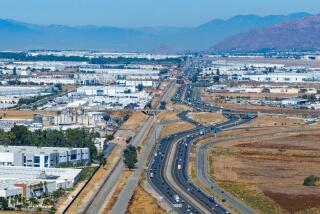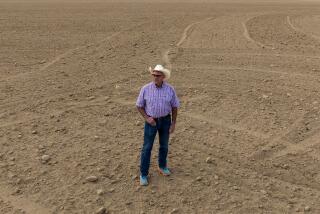Walking on Eggshells : Moorpark: Greater conflict between the expanding city and local egg ranches and quarries is foreseen.
- Share via
In 1961, Moorpark egg rancher Julius Goldman decided to move his business out of town, away from the small but growing community of 2,500 people who just wouldn’t stop complaining about the flies and stench from his thousands of chickens.
On a hilltop four miles north of town, he founded Egg City.
That same year, James P. Sandoval bought the sand-and-gravel quarry now called Blue Star Ready Mix Inc., located a few miles north of Moorpark. Sandoval thought that he was far enough from town to work undisturbed, mining the hills for sand and gravel and processing it into cement.
Thirty-one years later, the town of Moorpark is a city. Its population has grown nearly 1,000% to 26,000.
And some Moorpark officials say the giant egg ranches and quarries in the area are becoming increasingly out of place around their city, which now boasts the highest median household income in Ventura County, about $60,368 a year.
“I think with each day that goes by these businesses become less and less compatible,” Councilman Scott Montgomery said.
Now Moorpark is set to grow in the direction where the egg ranches and quarries are located. The City Council has tentatively approved the construction of more than 4,000 homes in the city’s northern hills over the next 20 years.
As Moorpark spreads north, the conflict between the city and the egg ranches and quarries is “going to grow,” predicted Moorpark resident and developer Tom Schleve, who lives about one mile from Blue Star.
“New residents will be less accepting of problems,” said Leta Yancy-Sutton, a former mayor of Moorpark.
Despite these concerns, the egg ranchers and quarry operators said the Moorpark area is ideal for their types of business and they aren’t leaving.
“The climate is very, very good for raising chickens. It doesn’t get that hot. It doesn’t get that cold,” said Gerald Rosen, president and chief operating officer of Egg City, which is located on Shekell Road. “We have a right to do what we do.”
But, he said, “I’m not going to sit on a soapbox and say chicken manure doesn’t smell. When that odor’s there, it’s bad.”
Rosen said, however, that some of the smell that reaches Moorpark could come from citrus orchards, which use dried chicken manure as fertilizer. In addition, county planners said, California laws allow agricultural businesses to generate certain degrees of nuisances, such as odors, that would not be permitted of other enterprises.
Egg City, now owned by a Japanese trading firm called Okura & Co., recently sold half its chickens to refocus its business on manufacturing food products, such as dried egg whites for cake mixes.
But the ranch still has 1.5 million birds that produce 175 tons of manure each day.
Just east of Egg City is Eggs West on Walnut Canyon Road. Eggs West officials could not be reached for comment, but the company has an estimated three-quarters of a million chickens, Rosen said.
The worst of the odor from the ranches usually drifts into Fillmore because of northerly winds. But when the winds shift, the stench wafts through northern Moorpark.
In addition to the odor, “there’s been a problem with insects,” Mayor Paul W. Lawrason Jr. said, referring to the flies and mosquitoes that breed in chicken manure.
The city’s bitterest complaints about Blue Star and the other quarries are over truck traffic.
Blue Star’s operation alone sends more than 600 trucks through the center of Moorpark each day, creating traffic hazards, noise and air pollution.
Added to this are the hundreds of trucks from smaller quarries and cement producers such as Quality Rock, Conejo Ready Mix Inc. and CalMat Co. that also go through the center of Moorpark on their way to Los Angeles County or western Ventura County.
“It’s becoming intolerable,” Schleve said of the truck traffic.
And Blue Star, the largest quarry in the area, has applied for county approval to nearly double its operation from 284 to 533 acres, which would increase the number of daily truck trips to up to 1,600.
Despite the concerns of city residents and officials over Blue Star’s proposed expansion, the quarry’s president said he has no intention of closing or moving his operation.
“Nobody likes us, but we’re here to stay,” James P. Sandoval said. “They’ll never be able to shut us down.”
Sandoval said state mining laws protect Blue Star and neighboring quarries against complaints from Moorpark officials because the companies produce valuable resources for the state.
The hills mined by Blue Star and other quarries are part of the Oak Ridge range, which stretches from Tapo Canyon Road in Simi Valley to Balcom Canyon Road west of Moorpark.
And Oak Ridge is one of the best sources in California for the type of sand and gravel used in concrete, county planners said.
Knowing this, Sandoval said, his family has been buying land in the area and now owns 1,300 acres. Sandoval predicts that there are enough mineral resources on the land to keep Blue Star operating for another 200 years.
The irony is that Blue Star produces cement used to build the new residential developments that potentially threaten the company’s existence, said Gary Austin, a vice president for Messenger Investment Co.
Messenger, an Irvine-based developer, has proposed to build more than 3,200 homes on a 4,000-acre site east of Blue Star and it will probably purchase its cement, sand and gravel for the new homes from the local quarries, Austin said.
“We like them there from that standpoint,” he said. “But nobody wants to live next door to them.”
Messenger’s proposed development will be about three miles from Blue Star, although Austin said the hills mined by the company are visible from the Messenger property. Most of the other proposed developments for northern Moorpark will be along the haul route used by the quarry trucks.
Many Moorpark residents also defended the quarries and egg ranches, despite the problems the industries bring.
“These industries existed for decades before Moorpark even began to grow,” said John Newton, a business consultant who has done work for Blue Star.
Egg ranches have been in the Moorpark area since at least the 1950s. The first quarries opened on Oak Ridge in the 1940s.
Newton also said the industries “provide critically needed jobs.” Although Egg City plans to lay off about 170 employees, it expects to continue employing 230 people. Blue Star employs close to 150 people at its peak operation.
Resident Doris Miller, an environmental health specialist for the county, said she occasionally smells the egg ranches from her home in northwestern Moorpark.
But Miller said she wants both the egg ranches and quarries to continue operating because their existence may help contain Moorpark’s urban sprawl.
“By keeping them there, they might provide a buffer and maintain some of the rural atmosphere that Moorpark was once well known for,” Miller said.
City and county officials said they believe that Moorpark can peacefully coexist with the egg ranches and quarries if the businesses take steps to become better neighbors.
County officials are working with both Egg City and Eggs West to bring in outside consultants who can recommend ways to reduce the odor from the chicken manure.
And Blue Star’s Sandoval said he will happily contribute toward building a Highway 23 bypass that would divert truck traffic out of downtown Moorpark.
Both city and county officials said they expect the county Board of Supervisors to require Blue Star to help build such an alternate truck route as a condition for the quarry’s expansion. The board is expected to consider the issue late this year or in early 1993.
Such a bypass road “will go an awful long way to ease the incompatibility that has been generated by the growth of the city of Moorpark,” Newton said.
More to Read
Inside the business of entertainment
The Wide Shot brings you news, analysis and insights on everything from streaming wars to production — and what it all means for the future.
You may occasionally receive promotional content from the Los Angeles Times.










